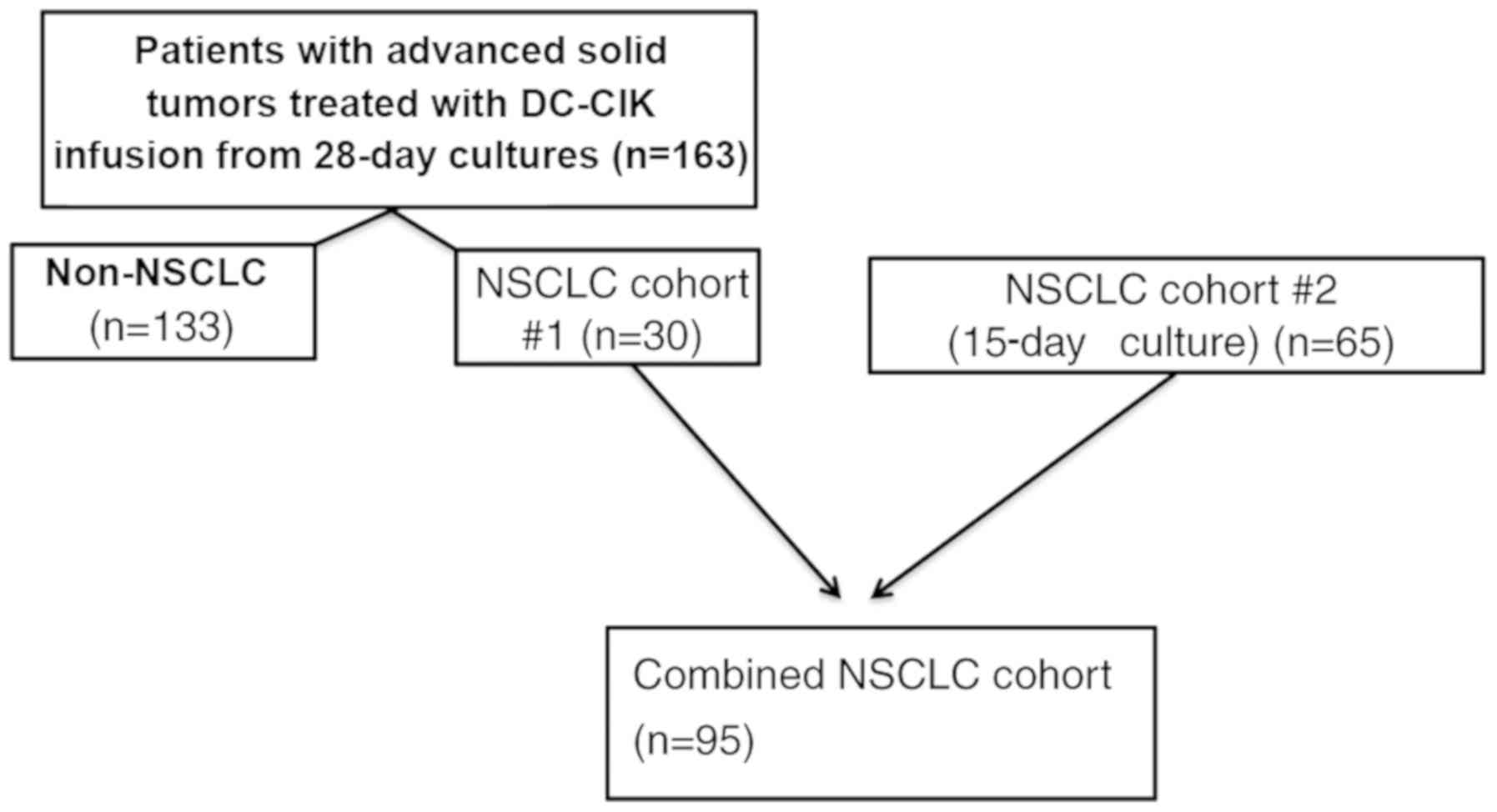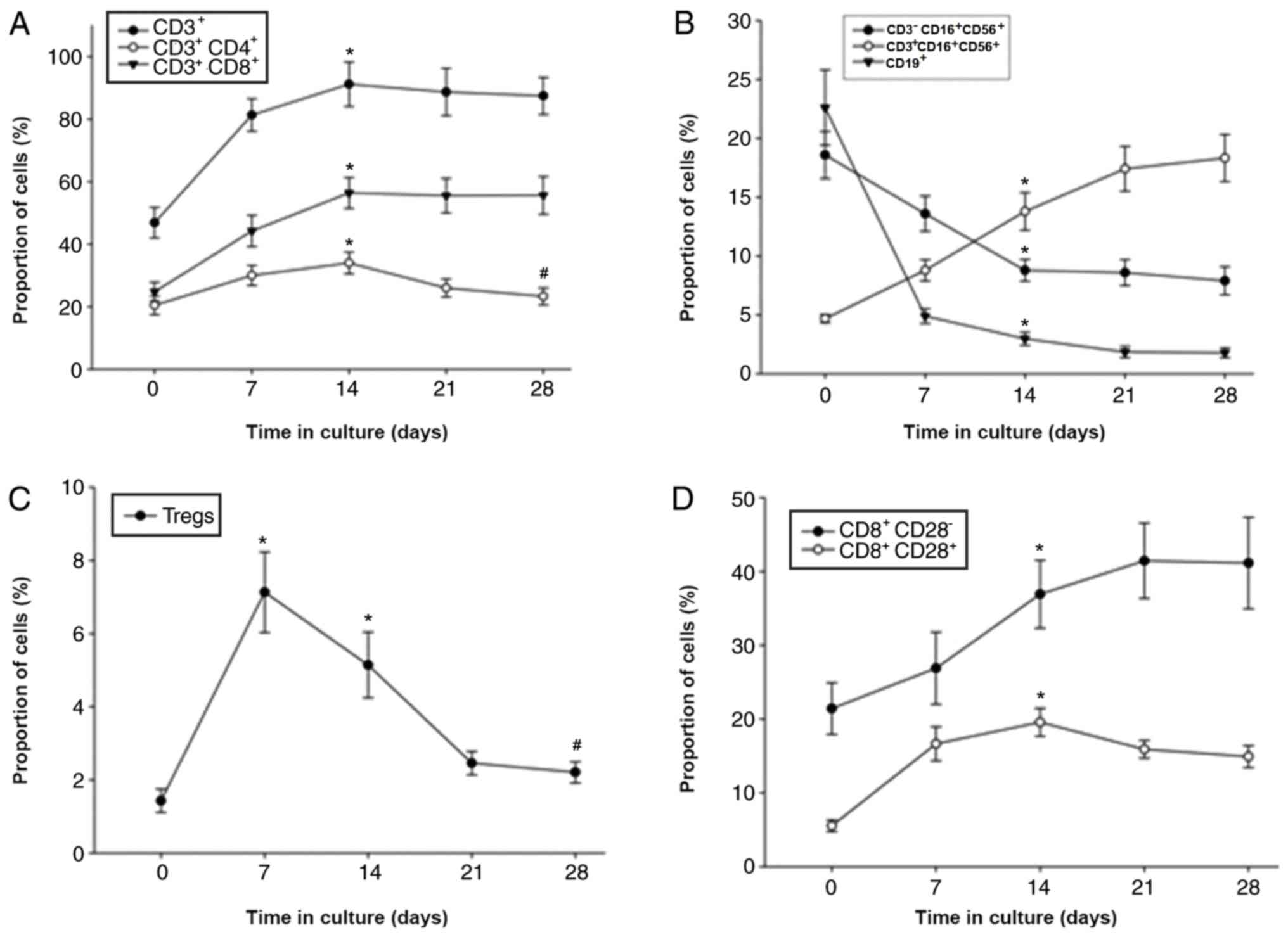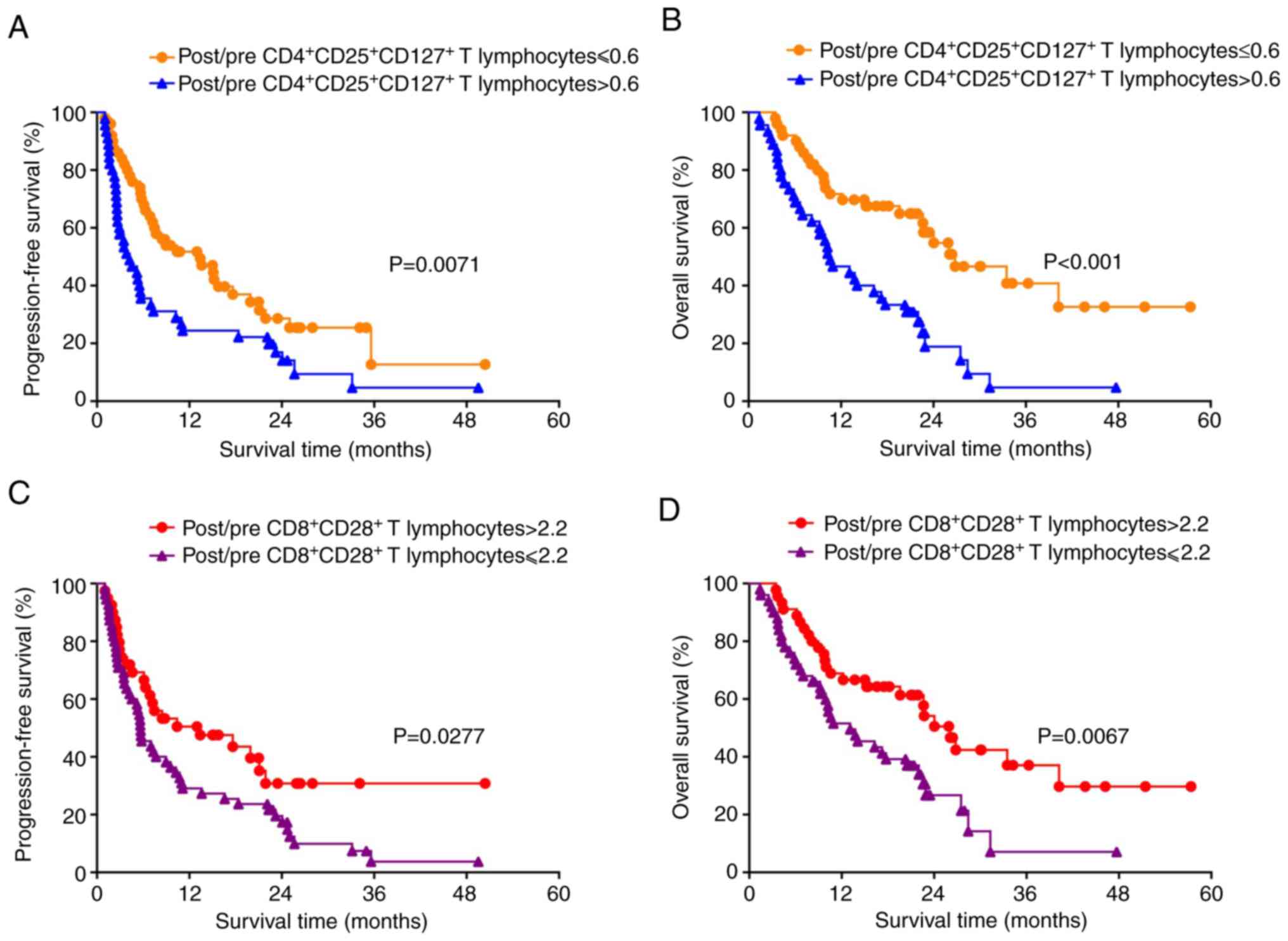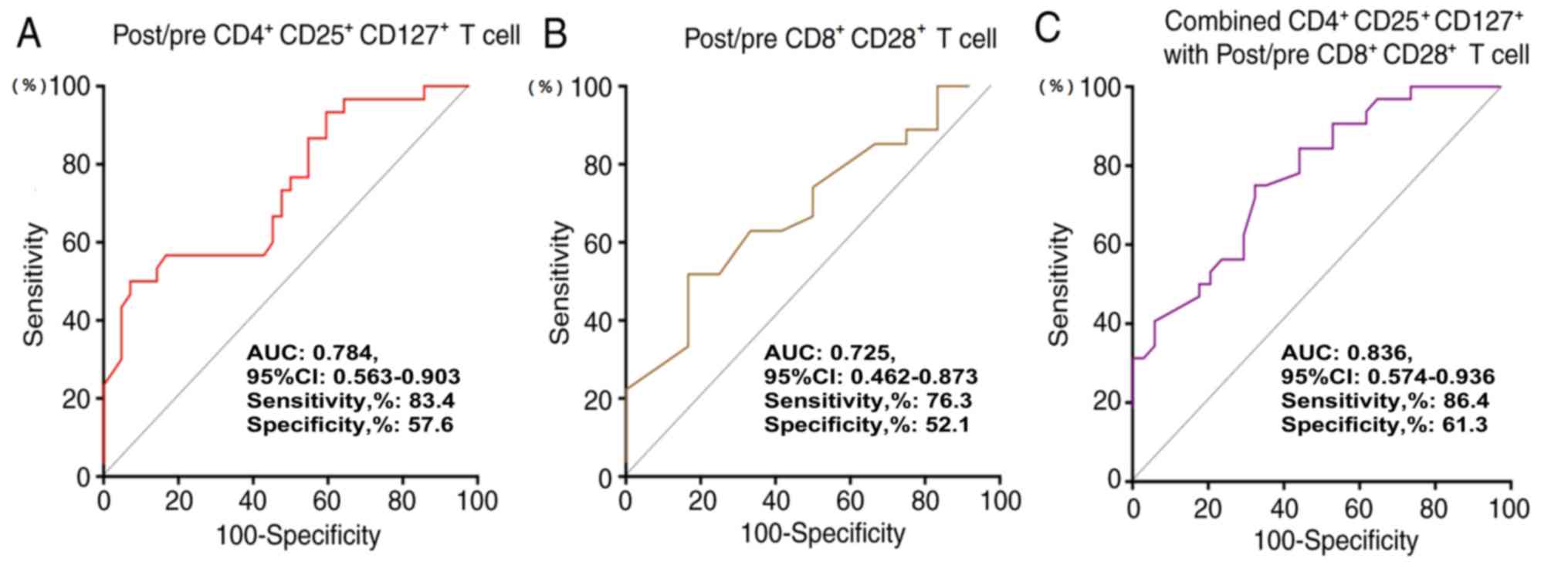|
1
|
Jemal A, Bray F, Center MM, Ferlay J, Ward
E and Forman D: Global cancer statistics. CA Cancer J Clin.
61:69–90. 2011. View Article : Google Scholar : PubMed/NCBI
|
|
2
|
Hirsch FR, Scagliotti GV, Mulshine JL,
Kwon R, Curran WJ Jr, Wu YL and Paz-Ares L: Lung cancer: Current
therapies and new targeted treatments. Lancet. 389:299–311. 2017.
View Article : Google Scholar : PubMed/NCBI
|
|
3
|
Rosenberg SA, Restifo NP, Yang JC, Morgan
RA and Dudley ME: Adoptive cell transfer: A clinical path to
effective cancer immunotherapy. Nat Rev Cancer. 8:299–308. 2008.
View Article : Google Scholar : PubMed/NCBI
|
|
4
|
Zhang Y, Zhu Y, Zhao E, He X, Zhao L, Wang
Z, Fu X, Qi Y, Ma B, Song Y and Gao Q: Autologous cytokine-induced
killer cell immunotherapy may improve overall survival in advanced
malignant melanoma patients. Immunotherapy. 9:1165–1174. 2017.
View Article : Google Scholar : PubMed/NCBI
|
|
5
|
Peng H, Yao M, Fan H, Song L, Sun J, Zhou
Z, Du Y, Lu K, Li T, Yin A, et al: Effects of autologous
cytokine-induced killer cells infusion in colorectal cancer
patients: A prospective study. Cancer Biother Radiopharm.
32:221–226. 2017. View Article : Google Scholar : PubMed/NCBI
|
|
6
|
Cai XR, Li X, Lin JX, Wang TT, Dong M,
Chen ZH, Jia CC, Hong YF, Lin Q and Wu XY: Autologous
transplantation of cytokine-induced killer cells as an adjuvant
therapy for hepatocellular carcinoma in Asia: An update
meta-analysis and systematic review. Oncotarget. 8:31318–31328.
2017.PubMed/NCBI
|
|
7
|
Ryu JI, Han MH, Cheong JH, Kim JM and Kim
CH: Current update of adoptive immunotherapy using cytokine-induced
killer cells to eliminate malignant gliomas. Immunotherapy.
9:411–421. 2017. View Article : Google Scholar : PubMed/NCBI
|
|
8
|
Kong DS, Nam DH, Kang SH, Lee JW, Chang
JH, Kim JH, Lim YJ, Koh YC, Chung YG, Kim JM and Kim CH: Phase III
randomized trial of autologous cytokine-induced killer cell
immunotherapy for newly diagnosed glioblastoma in Korea.
Oncotarget. 8:7003–7013. 2017. View Article : Google Scholar : PubMed/NCBI
|
|
9
|
Chung MJ, Park JY, Bang S, Park SW and
Song SY: Phase II clinical trial of ex vivo-expanded
cytokine-induced killer cells therapy in advanced pancreatic
cancer. Cancer Immunol Immunother. 63:939–946. 2014. View Article : Google Scholar : PubMed/NCBI
|
|
10
|
Hontscha C, Borck Y, Zhou H, Messmer D and
Schmidt-Wolf IG: Clinical trials on CIK cells: First report of the
international registry on CIK cells (IRCC). J Cancer Res Clin
Oncol. 137:305–310. 2011. View Article : Google Scholar : PubMed/NCBI
|
|
11
|
Ren J, Gwin WR, Zhou X, Wang X, Huang H,
Jiang N, Zhou L, Agarwal P, Hobeika A, Crosby E, et al: Adaptive T
cell responses induced by oncolytic Herpes Simplex
Virus-granulocyte macrophage-colony-stimulating factor therapy
expanded by dendritic cell and cytokine-induced killer cell
adoptive therapy. Oncoimmunology. 6:e12645632017. View Article : Google Scholar : PubMed/NCBI
|
|
12
|
Jiang N, Qiao G, Wang X, Morse MA, Gwin
WR, Zhou L, Song Y, Zhao Y, Chen F, Zhou X, et al: Dendritic
Cell/Cytokine-induced killer cell immunotherapy combined with S-1
in patients with advanced pancreatic cancer: A prospective study.
Clin Cancer Res. 23:5066–5073. 2017. View Article : Google Scholar : PubMed/NCBI
|
|
13
|
Song QK, Ren J, Zhou XN, Wang XL, Song GH,
Di LJ, Yu J, Hobeika A, Morse MA, Yuan YH, et al: The prognostic
value of peripheral CD4+CD25+ T lymphocytes among early stage and
triple negative breast cancer patients receiving dendritic
cells-cytokine induced killer cells infusion. Oncotarget.
6:41350–41359. 2015. View Article : Google Scholar : PubMed/NCBI
|
|
14
|
Lin M, Liang S, Jiang F, Xu J, Zhu W, Qian
W, Hu Y, Zhou Z, Chen J, Niu L, et al: 2003-2013, a valuable study:
Autologous tumor lysate-pulsed dendritic cell immunotherapy with
cytokine-induced killer cells improves survival in stage IV breast
cancer. Immunol Lett. 183:37–43. 2017. View Article : Google Scholar : PubMed/NCBI
|
|
15
|
Zhang Y, Qi Y, Wang A, Ma B, Fu X, Zhao L
and Gao Q: Clinical effects of autologous cytokine-induced killer
cell-based immunotherapy in the treatment of endometrial cancer: A
case report and literature review. Onco Targets Ther. 10:4687–4690.
2017. View Article : Google Scholar : PubMed/NCBI
|
|
16
|
Qiao G, Wang X, Zhou L, Zhou X, Song Y,
Wang S, Zhao L, Morse MA, Hobeika A, Song J, et al: Autologous
dendritic cell-cytokine induced killer cell immunotherapy combined
with S-1 plus cisplatin in patients with advanced gastric cancer: A
prospective study. Clin Cancer Res. 25:1494–1504. 2019. View Article : Google Scholar : PubMed/NCBI
|
|
17
|
Oken MM, Creech RH, Tormey DC, Horton J,
Davis TE, McFadden ET and Carbone PP: Toxicity and response
criteria of the Eastern cooperative oncology group. Am J Clin
Oncol. 5:649–655. 1982. View Article : Google Scholar : PubMed/NCBI
|
|
18
|
Huang H, Chen A, Wang T, Wang M, Ning X,
He M, Hu Y, Yuan L, Li S, Wang Q, et al: Detecting cell-in-cell
structures in human tumor samples by E-cadherin/CD68/CD45 triple
staining. Oncotarget. 6:20278–20287. 2015.PubMed/NCBI
|
|
19
|
Ren J, Di L, Song G, Yu J, Jia J, Zhu Y,
Yan Y, Jiang H, Liang X, Che L, et al: Selections of appropriate
regimen of high-dose chemotherapy combined with adoptive cellular
therapy with dendritic and cytokine-induced killer cells improved
progression-free and overall survival in patients with metastatic
breast cancer: Reargument of such contentious therapeutic
preferences. Clin Transl Oncol. 15:780–788. 2013. View Article : Google Scholar : PubMed/NCBI
|
|
20
|
Hanley JA: Receiver operating
characteristic (ROC) methodology: The state of the art. Crit Rev
Diagn Imaging. 29:307–335. 1989.PubMed/NCBI
|
|
21
|
Takimoto R, Kamigaki T, Okada S, Matsuda
E, Ibe H, Oguma E, Naitoh K, Makita K and Goto S: Efficacy of
adoptive immune-cell therapy in patients with advanced gastric
cancer: A retrospective study. Anticancer Res. 37:3947–3954.
2017.PubMed/NCBI
|
|
22
|
Shi G, Zhou C, Wang D, Ma W, Liu B and
Zhang S: Antitumor enhancement by adoptive transfer of tumor
antigen primed, inactivated MHC-haploidentical lymphocytes. Cancer
Lett. 343:42–50. 2014. View Article : Google Scholar : PubMed/NCBI
|
|
23
|
Joshi NS, Akama-Garren EH, Lu Y, Lee DY,
Chang GP, Li A, DuPage M, Tammela T, Kerper NR, Farago AF, et al:
Regulatory T cells in tumor-associated tertiary lymphoid structures
suppress Anti-tumor T cell responses. Immunity. 43:579–590. 2015.
View Article : Google Scholar : PubMed/NCBI
|
|
24
|
Savage PA, Leventhal DS and Malchow S:
Shaping the repertoire of tumor-infiltrating effector and
regulatory T cells. Immunol Rev. 259:245–258. 2014. View Article : Google Scholar : PubMed/NCBI
|
|
25
|
Dooms H, Wolslegel K, Lin P and Abbas AK:
Interleukin-2 enhances CD4+ T cell memory by promoting the
generation of IL-7R alpha-expressing cells. J Exp Med. 204:547–557.
2007. View Article : Google Scholar : PubMed/NCBI
|
|
26
|
Bos PD, Plitas G, Rudra D, Lee SY and
Rudensky AY: Transient regulatory T cell ablation deters
oncogene-driven breast cancer and enhances radiotherapy. J Exp Med.
210:2435–2466. 2013. View Article : Google Scholar : PubMed/NCBI
|
|
27
|
Marabelle A, Kohrt H, Sagiv-Barfi I, Ajami
B, Axtell RC, Zhou G, Rajapaksa R, Green MR, Torchia J, Brody J, et
al: Depleting tumor-specific Tregs at a single site eradicates
disseminated tumors. J Clin Invest. 123:2447–2463. 2013. View Article : Google Scholar : PubMed/NCBI
|
|
28
|
Dumitriu IE: The life (and death) of CD4+
CD28(null) T cells in inflammatory diseases. Immunology.
146:185–193. 2015. View Article : Google Scholar : PubMed/NCBI
|
|
29
|
Maly K and Schirmer M: Corrigendum to ‘The
Story of CD4 (+) CD28(−) T cells revisited: Solved or still
ongoing?’. J Immunol Res. 2015:2516572015. View Article : Google Scholar : PubMed/NCBI
|
|
30
|
Filaci G, Fenoglio D, Fravega M, Ansaldo
G, Borgonovo G, Traverso P, Villaggio B, Ferrera A, Kunkl A, Rizzi
M, et al: CD8+ CD28-T regulatory lymphocytes inhibiting T cell
proliferative and cytotoxic functions infiltrate human cancers. J
Immunol. 179:4323–4334. 2007. View Article : Google Scholar : PubMed/NCBI
|
|
31
|
Casado JG, Soto R, DelaRosa O, Peralbo E,
del Carmen Muñoz-Villanueva M, Rioja L, Peña J, Solana R and
Tarazona R: CD8 T cells expressing NK associated receptors are
increased in melanoma patients and display an effector phenotype.
Cancer Immunol Immunother. 54:1162–1171. 2005. View Article : Google Scholar : PubMed/NCBI
|
|
32
|
Zhao Y, Qiao G, Wang X, Song Y, Zhou X,
Jiang N, Zhou L, Huang H, Zhao J, Morse MA, et al: Combination of
DC/CIK adoptive T cell immunotherapy with chemotherapy in advanced
non-small-cell lung cancer (NSCLC) patients: A prospective
patients' preference-based study (PPPS). Clin Transl Oncol.
21:721–728. 2019. View Article : Google Scholar : PubMed/NCBI
|


















